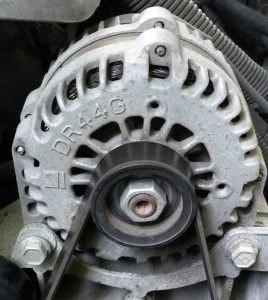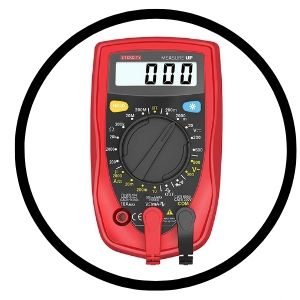A bad alternator can leave your vehicle without power and unable to move. Alternators don’t always go bad in the exact same way. We’ll cover the symptoms of when an alternator goes bad, and how to diagnose a bad one (which is really pretty easy).
How an Alternator Works
An alternator’s job is to provide your vehicle electricity as it is running. The battery stores enough of this energy to be able to start the engine. While the engine is running, most of the power is coming directly from the alternator.
The alternator is turned by a serpentine belt. It’s worth noting that a bad serpentine belt can cause the alternator to stop charging effectively if it’s gone bad. If it has gone bad, It’ll look dry rotted. If it’s been slipping a lot it’ll have a glossy shine to it. You’ll have probably heard it squeal when you start the engine. They typically don’t fail quietly, unless they break entirely.
Bad Alternator Symptoms
Most of the time, when replacing an alternator, the alternator itself is usually around $100, unless it’s a high end luxury car. It’s the labor that makes the job expensive. Here are the most common symptoms of a bad alternator:

1. Battery Light
The battery light is designed to inform you that there is not enough voltage to properly charge the battery, or that the battery itself is not holding the proper voltage.
On rare occasions the service engine soon light may illuminate. Also, some vehicles have an “alt” light that specifically tells you there is a problem with the charging system, and not the battery itself.
2. Dead Battery
Outside of the battery warning light, a dead battery is the most common symptom of a bad alternator. As the alternator can no longer supply your car or truck with an adequate power supply, it will begin to feed off of the reserve in the battery. The question is did the battery die because it was bad, or did the alternator not charge it?
Often, the battery light will come on, the alternator gets replaced, and then a few days later the vehicle dies. That’s why it’s important to test the battery before you just replace it. Nearly any auto parts store will test your battery for free to see if it holds a charge. The process can sometimes take an hour or so, but it’s worth it to know before throwing money into a battery that you do not need.
3. Stalling Engine
A bad alternator can drain a battery fast. When the battery gets so dead it will no longer be able to power the ignition system. As the ignition system is no longer able to produce a full powered spark, the engine will begin to sputter and stall.
If you find yourself in a position where you suspect that your voltage is dropping, but you need to safely get off the highway, turn off everything that you possibly can. Turning off the radio, daytime running lights, air conditioning, heated seats, and anything else you can think of will allow all of the limited voltage in the battery to go to the ignition system.
4. Strange Noises
If your vehicle’’s alternator starts to have bearings that fail, it’ll begin to make some very obnoxious noises. If the serpentine belt has gone bad, it can make some noises too, but it won’t sound metallic like the bearings going bad would.
5. Dim headlights
Dimming headlights are one of the most common signs of a bad alternator. Dim headlights indicate that the alternator can’t keep up with the energy demand of the lights. As your vehicle begins to eat through the voltage stored in the battery, the headlights will begin to fade.
5. Electric Accessory Issues
Many accessories in a vehicle require quite a bit of voltage. Heated seats, the blower motor, power windows, and even the radio will work erratically or not work at all when the alternator is bad.
Bad Alternator Diagnosis
Some alternators go bad right away, and some slowly lose their ability to charge under heavy loads. The ones that fail completely are easy to diagnose. The battery drains and you are stuck with a car or truck that goes nowhere.
The challenge is diagnosing an alternator that is just not quite charging like it needs to be. You can easily diagnose it with almost any multimeter. Here’s what to do.

- Get a multimeter. They are cheap (you can get a decent one for $10), and you can get them almost anywhere.
- Set it to read voltage. Specifically, you’ll need to set it to 20V DC.
- With your vehicle turned off, connect the negative side of the meter to the negative battery post or wire. You’ll then touch the positive side of the voltmeter to the positive battery wire. With the engine off, you should get a reading somewhere between 12.0 volts and 12.6 volts.
- Now that you have this baseline, it’s time to turn the engine on. Let’s go ahead and leave the air conditioner off, as well as the headlights and any other accessories.
- With the engine just fired up, you should get over 14.2 volts. If you got 14.2 or more volts, the alternator is charging fine. If it’s still showing in the 12’s, it’s time to replace the alternator. If it’s producing a voltage level in the 13’s, go ahead and take it into a parts store and have it tested. It’s probably bad.
- Now, assuming that the alternator was producing over 14 volts, go ahead and turn on the headlights, air conditioner, radio, and any other accessory you can think of, and run the same test all over again. If the voltage dropped back into the 12’s, it’s a very strong indication that the alternator is bad. It’s still worth having it tested, but be prepared to replace it.
Another test you can do that’s not nearly as scientific is to turn the headlights on and then start the engine. They should be brighter after the engine starts than they were before.
Now with the engine idling, rev it up a little bit. Did the headlights get brighter as you increase the RPM? This is a very strong indication that the alternator has in fact gone bad.
This test depends a lot on you to notice very subtle differences in lighting. It should not be used in substitute for checking the voltage as described directly above.
Conclusion: Bad Alternator Diagnosis
Over the life of any vehicle, the alternator is going to go bad. Good luck diagnosing the alternator in your vehicle. If there is anything that you would like to add, please leave a comment below.
